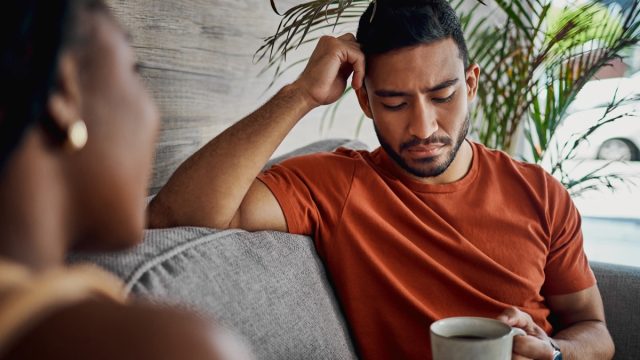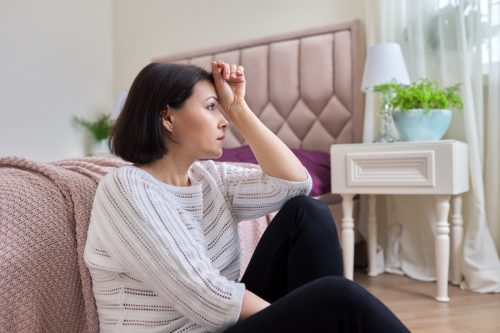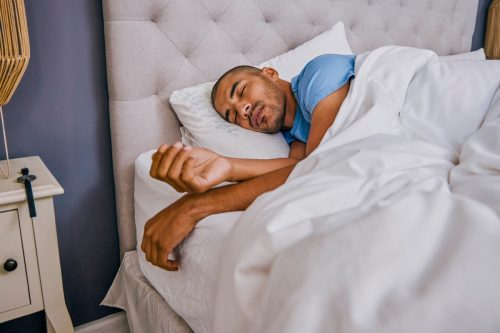Not Getting Enough of This Can Make Your Partner Less Generous, New Study Says

No relationship is smooth sailing all the time. It’s both normal and common for couples to experience hard moments here and there, and working through those issues can actually help strengthen a relationship. Even so, that doesn’t mean that you should accept problems that can be solved with relatively straightforward changes. A new study has just pinpointed an underlying factor that could be making your partner less generous, and it has a clear remedy. Read on to find out what your partner could be lacking, and how that might be hurting your relationship.
READ THIS NEXT: Being Around This Makes Your Partner More Likely to Cheat, New Study Says.
Relationships need generosity to last.

Generosity is necessary when building a good foundation for any lasting relationship. In 2014, renowned marriage researcher John Gottman, PhD, and his wife, psychologist Julie Gottman, PhD, told The Atlantic that most couples who stand the test of time do so because both partners bring generosity to the relationship. Generosity can come in many different forms, but according to the University of Notre Dame’s Science of Generosity Initiative, it encompasses “the virtue of giving good things to others freely and abundantly.”
“A generous marriage or relationship that includes compassion and small daily acts of kindness is more likely to bring happiness to both partners,” Dylan Klempner, a relationship expert in the Department of Family, Youth and Community Sciences at University of Florida, wrote for the department’s Strengthening Marriages and Relationships Training program. “Generosity creates a continuing cycle of joy. The process of getting to know our partner better, by learning what makes them happy, adds to our happiness too.”
But one thing could be causing your partner to be less generous.

The opposite of generosity is selfishness—and if you’ve noticed more of this from your partner, there might be an underlying issue at play. Eti Ben Simon, PhD, a research scientist from the University of California Berkeley and Matthew Walker, PhD, a professor of psychology at the university, recently found that a lack of sleep can increase a person’s selfishness, especially within relationships.
For part of their study, which was published Aug. 23 in the PLOS Biology journal, they tracked more than 100 people online and measured the quality of their sleep over three to four nights. The researchers found that the decrease in someone’s sleep “from one night to the next predicted a significant decrease in the desire to help other people from one subsequent day to the next,” Ben Simon said in a statement.
She added, “We’re starting to see more and more studies, including this one, where the effects of sleep loss don’t just stop at the individual, but propagate to those around us. If you’re not getting enough sleep, it doesn’t just hurt your own well-being, it hurts the well-being of your entire social circle.”
For more relationship advice delivered straight to your inbox, sign up for our daily newsletter.
Lack of sleep can negatively affect your brain function.

The negative physical health effects of inadequate sleep have been well-researched and reported over the years. Our emotions and behavior have a lot to do with how much sleep we get, according to David Helfand, PsyD, a licensed psychologist specializing in couples therapy, neurofeedback, and brain mapping. “Poor sleep quality generally leads to slowed processing in our brain and a slower and foggy prefrontal cortex,” Helfand says. “This area behind our forehead is responsible for more advanced primate functions such as executive functioning and emotional regulation.”
Laurence Miller, PhD, a licensed clinical and forensic psychologist and an adjust professor at the Florida Atlantic University, tells Best Life this can result in “ego depletion,” a concept that explains how our behavior can be affected when our mental energy is low. “Fatigue shrinks the ways in which people are willing to extend themselves in social relationships and other areas,” Miller explains.
You need between seven to nine hours of sleep each night.

Every night, our bodies go through multiple sleep cycles that are roughly 90 to 120 minutes each, according to Annika Carroll, a sleep and health coach and the CEO of Sleep Like a Boss. These cycles contain different sleep phases, such as light, deep, and rapid eye movement (REM)—which is one of the most important factors of sleep when it comes to our generosity and compassion, according to Carroll.
“REM sleep is the sleep phase where we consolidate memory and regulate emotions,” she explains. “During the later sleep cycles, we experience more REM sleep. So, if we cut our sleep short, we miss out on valuable REM sleep and thus don’t regulate our emotions well.”
Carroll tells Best Life that most people should be aiming to get around seven to nine hours of sleep each night. If not, our bodies will enter the stressed state in which we tend to “put survival over compassion or generosity,” making us more selfish and less generous.
“It is time as a society to abandon the idea that sleep is unnecessary or a waste and, without feeling embarrassed, start getting the sleep that we need,” Ben Simon said in her statement. “It is the best form of kindness we can offer ourselves, as well as the people around us.”